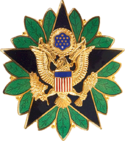
Blitzkrieg or Bewegungskrieg is a word used to describe a combined arms surprise attack using a rapid, overwhelming force concentration that may consist of armored and motorized or mechanized infantry formations, together with artillery, air assault and close air support, with intent to break through the opponent's lines of defense, dislocate the defenders, unbalance the enemies by making it difficult to respond to the continuously changing front, and defeat them in a decisive Vernichtungsschlacht: a battle of annihilation.
Military doctrine is the expression of how military forces contribute to campaigns, major operations, battles, and engagements. A military doctrine outlines what military means should be used, how forces should be structured, where forces should be deployed, and the modes of cooperation between types of forces. "Joint doctrine" refers to the doctrines shared and aligned by multinational forces or joint service operations.
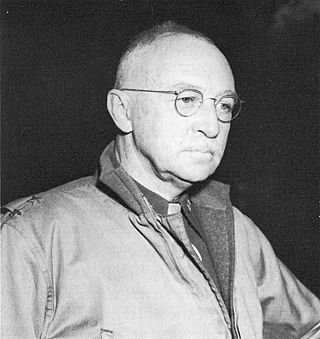
Major General John Porter Lucas was a senior officer of the United States Army who saw service in World War I and World War II. He is most remembered for being the commander of VI Corps during the Battle of Anzio in early 1944 the Italian campaign of World War II.
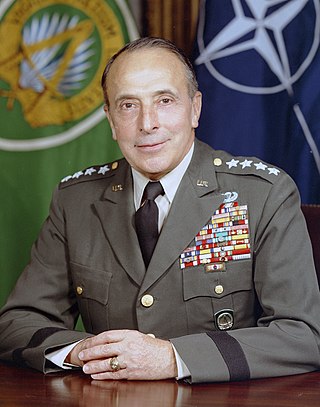
Lyman Louis Lemnitzer was a United States Army general who served as the fourth chairman of the Joint Chiefs of Staff from 1960 to 1962. He then served as the Supreme Allied Commander Europe of NATO from 1963 to 1969.

In warfare, infiltration tactics involve small independent light infantry forces advancing into enemy rear areas, bypassing enemy frontline strongpoints, possibly isolating them for attack by follow-up troops with heavier weapons. Soldiers take the initiative to identify enemy weak points and choose their own routes, targets, moments and methods of attack; this requires a high degree of skill and training, and can be supplemented by special equipment and weaponry to give them more local combat options.

Maneuver warfare, or manoeuvre warfare, is a military strategy which emphasizes movement, initiative and surprise to achieve a position of advantage. Maneuver seeks to inflict losses indirectly by envelopment, encirclement and disruption, while minimizing the need to engage in frontal combat. In contrast to attrition warfare where strength tends to be applied against strength, maneuver warfare attempts to apply strength against weakness in order to accomplish the mission.

Lesley James McNair was a senior United States Army officer who served during World War I and World War II. He attained the rank of lieutenant general during his life; he was killed in action during World War II, and received a posthumous promotion to general.

Marine Corps University is a military education university system of the United States Marine Corps. It is part of the Naval University System and accredited by the Commission on Colleges of the Southern Association of Colleges and Schools to award Master's Degrees.

General Peyton Conway March was a senior officer of the United States Army. He served in the Philippines, on the Mexican border, and World War I. March was the ninth Chief of Staff from 1918 to 1921, accomplishing centralized control over supply, the creation of the Air Service, Tank Corps, and Chemical Warfare Service.
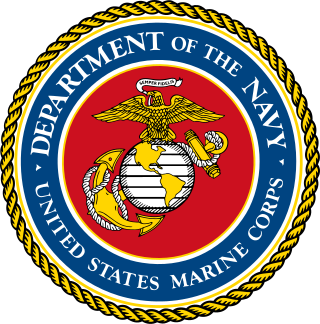
The United States Fleet Marine Forces (FMF) are combined general- and special-purpose forces within the United States Department of the Navy that perform offensive amphibious or expeditionary warfare and defensive maritime employment. The Fleet Marine Forces provide the National Command Authority (NCA) with a responsive force that can conduct operations in any spectrum of conflict around the globe.

The United States Marine Corps (USMC), also referred to as the United States Marines, is the maritime land force service branch of the United States Armed Forces responsible for conducting expeditionary and amphibious operations through combined arms, implementing its own infantry, artillery, aerial, and special operations forces. The U.S. Marine Corps is one of the eight uniformed services of the United States.

Major General Horace H. Fuller was an American soldier and general in the first half of the 20th century. He is best known for his command of the 41st Infantry Division in the South West Pacific Area during World War II.

Brigadier General Dion Williams was an officer in the United States Marine Corps. He was the sixth assistant commandant of the Marine Corps from August 1, 1925 – July 1, 1928. During his early career, Williams pioneered the first conceptual study of amphibious reconnaissance in the United States and becoming one of the strongest advocates in having the Marine Corps assume the amphibious, expeditionary role. During his career, he fought guerrillas in the Philippines and Dominican Republic during the Spanish–American War.

Montgomery Meigs Macomb was a United States Army Brigadier General. He was a veteran of the Spanish–American War and World War I, and was notable for serving as commander of the Hawaiian Department, the Army War College, and Fort Sill.

Major General Elbert Louis Ford was a career officer in the United States Army and served as the 18th Chief of Ordnance for the U.S. Army Ordnance Corps.
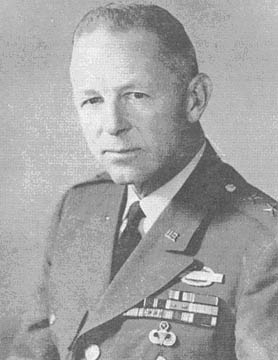
Fillmore Kennady "Ken" Mearns was a United States Army lieutenant general who served as commander of the 25th Infantry Division during the Vietnam War and later as commander of VII Corps in West Germany.
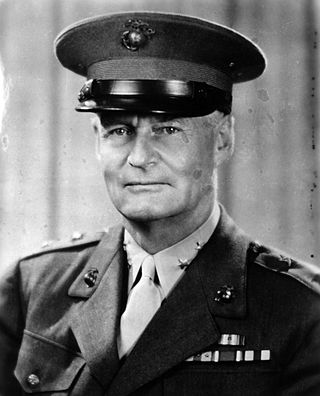
Philip Huston Torrey was an officer of the United States Marine Corps with the rank of major general, who is most noted for his service as commanding general of Marine Corps Base Quantico during World War II. He was responsible for the training of officers at Quantico who subsequently sailed to the Pacific theater.
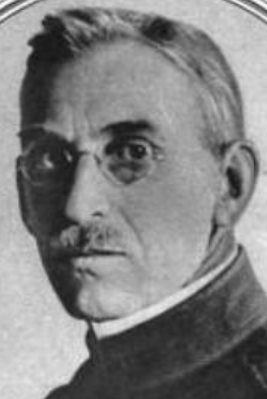
Henry Jervey was an officer in the United States Army who served as director, Operations Division, General Staff, during World War I. In 1917, he wrote the book Warfare of the Future. At the outbreak of World War I, Jervey was appointed brigadier general and served both as brigade and division commander. Later, he became assistant to General Peyton C. March, chief of staff in Washington. He was promoted to major general and made director, Operations Division, General Staff. He filled this position until September 1, 1921. Jervey was awarded the Distinguished Service Medal of the Army for his services as director of operations, General Staff. He also received foreign decorations from Great Britain, France, Italy and Belgium.

Robert Burneston Luckey was a decorated officer in the United States Marine Corps with the rank of lieutenant general. A veteran of several wars, Luckey completed his career as commanding general, Fleet Marine Force, Atlantic.

The School of Advanced Warfighting (SAW) in the United States Marine Corps is an Advanced Intermediate Level School (A-ILS) that produces officers qualified to fill high-impact service and joint planning billets. The curriculum features numerous case studies, multiple planning exercises, extensive staff rides, and a consideration of future war. Graduates earn the secondary Military Occupational Specialty (MOS) 0505 Marine Air Ground Task Force (MAGTF) planner and a Masters Degree in Operational Studies. SAW was designed to develop field grade officers for the Marine Corps most difficult operational and planning challenges.


